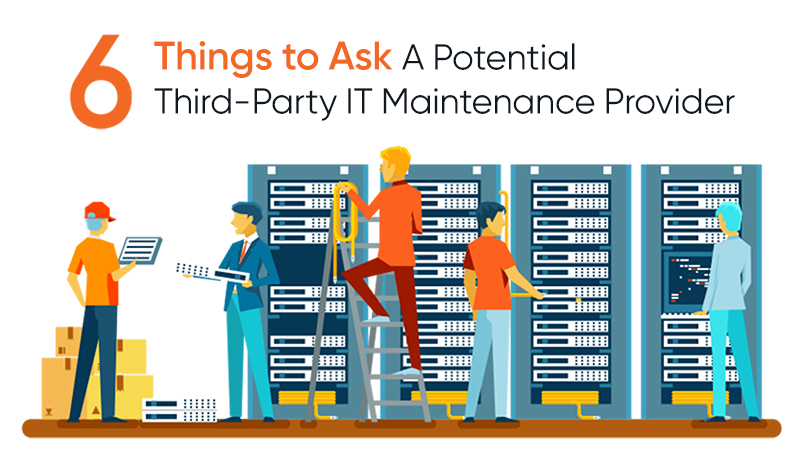The search for a third-party maintenance provider can be overwhelming. We know.
Many vendors exist, but it can be difficult to find a true partner with solid experience who also understands your business strategy. As you conduct your search, take the time to consider the requirements in more detail and what you’re really looking for in the partnership.
If you’re looking for a third-party vendor or a maintenance strategy partner, you should ask about these six topics to make sure they share your maintenance goals.
1. Global Delivery Support
Whether you have locations domestically or all over the globe, it’s important to find a partner that is truly global. Ensure your provider has FSLs (Forward Stocking Locations) and sparing depots placed to meet your SLAs globally and access to round-the-clock support every day of the year. Ensure that multiple languages are supported if that’s what your business requires. If you have locations in difficult countries, confirm your provider has the necessary certifications and capabilities to provide the support you need in each region.
2. 100% Sparing
A provider’s sparing ‘philosophy’ is important. Ensure that all hardware parts under contract are tested and spared at a location close enough to meet your SLA. Ask potential providers to explain their sparing process in detail. Do they own the part? Has the part been tested? Can it be deployed fast enough to meet your SLA? Also, ensure that a provider will grow with you – even if that means adding FSLs around the globe to continue to meet your needs.
3. Certifications
It’s always a good idea to validate potential partners with industry-recognized certifications. Ensure that your provider is adhering to the highest quality and security standards internationally. A few certifications to be aware of:
- TL9000 is a comprehensive QMS that requires robust controls for organizations involved in telecommunications. Fewer than 1,500 companies hold TL9000 certification, and it’s the highest international standard for telecom industry suppliers.
- C-TPAT (Customs-Trade Partnership Against Terrorism) certification is led by U.S. Customs and Border Protection and is focused on improving global supply chain security with respect to terrorism.
- ISO 27001:2013 is for Information Security Management Systems and is one of the most widely recognized and prestigious security standards available. Organizations with this certification are confirmed to be ISMS compliant and in line with the latest industry standards and best practices.
- R2 Responsible Recycling certification provides a standard, a common set of processes, safety measures, and documentation requirements for businesses that repair and recycle electronics.
4. Flexible Contracts
Ensure that all equipment you have in your IT infrastructure can be managed in one place. Your provider should be able to accommodate multi-generation, multi-vendor and multi-national support contracts and make them accessible to you through a centralized portal. Ask for a detailed demonstration of the contract and ticket management system to ensure it can deliver the level of service you require for your complex, multi-vendor network.
5. Engineering Resources
Access to high-level engineers who are empowered to diagnose and resolve your issue immediately is critical. No one likes to be bounced and call transferred multiple times. Ask potential vendors to provide documentation that outlines their ticket flow process from first call to complete resolution with clear SLAs along the way. Pick a partner whose mission is to provide consistent premium customer service and technical support 24 hours a day, 365 days a year. TACs should be structured with a ‘follow-the-sun’ approach, utilizing service centers strategically around the globe.
6. Testing
Require that your provider conduct full line rate testing on all equipment that can be stress tested before it is deployed to you or a designated FSL. Specifically, the supplier should use a Spirent® or Ixia test bed for all testing and be able to prove a 0.5% or less failure rate. Furthermore, verify your provider utilizes ultra-protective packaging to avoid any damage during shipping.
There’s no time like the present to explore how the ever-increasing role of third-party maintenance is helping organizations around the world get a better return on their support investments. Take time to thoroughly evaluate potential providers by asking the right questions and requiring them to demonstrate their capabilities.
The health of your IT infrastructure and your business depends on having a reliable partner. Choose a provider that has demonstrated experience, third-party validation and truly understands your business needs. Choose Curvature.



